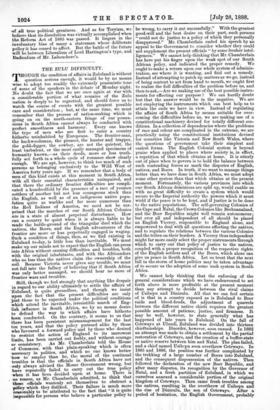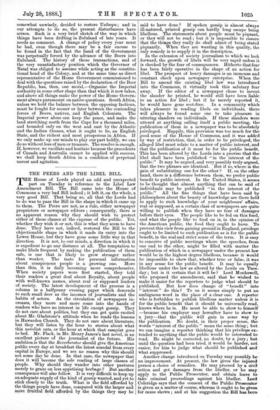THE ZULU DIFFICULTY.
THOUGH the condition of affairs in Zululand is without question serious enough, it would be by no means -wise to adopt too readily the extremely pessimistic tone of some of the speakers in the debate of Monday night. No doubt the fact that we are once again at war with a considerable portion of what remains of the Zulu nation is deeply to be regretted, and should force us to watch the course of events with the greatest possible care and consideration ; but, at the same time, we must remember that the process of nation-making which is going on on the north-eastern fringe of our posses- sions in South Africa cannot always be conducted with perfect smoothness and harmony. Every one knows the type of men who are first to enter a country hitherto uninhabited by Europeans. The frontier-man, the backwoodsman, the pioneer, the hunter and trapper, the gold-digger, the cowboy, are not the quietest, the least turbulent, or the most easily managed specimens of humanity known,—as their deeds, more or less truth- fully set forth in a whole cycle of romance show clearly enough. We are apt, however, to think too much of such persons as belonging exclusively to the Wild West of America forty years ago. If we remember that a body of men of this kind exists at this moment in South Africa, with all their essential characteristics unimpaired, and that there the ordinary frontier difficulties are compli- cated a hundredfold by the presence of a race of yeomen settlers of another but not less courageous stock than the English, as well as of an indigenous native popu- lation quite as warlike and far more numerous than the Red Indians of America, we need not be sur- prised that the marches of our South African Colonies are in a state of almost perpetual disturbance. How can a country be quiet when it is always liable to be made the battle-ground of the triangular duel which the natives, the Boers, and the English adventurers of the frontier are more or less perpetually engaged in waging. Such a condition of things, then, as we find existing in Zululand to-day, is little less than inevitable. We must make up our minds not to expect that the English can press into Africa without causing difficulties and troubles, both with the original inhabitants, and with the Africanders who no less than the natives claim the ownership of the soil. Because Victoria never gives any trouble, we must not fall into the fallacy of believing that if South Africa was only better managed, we should hear no more of frontier wars and troubles.
Still, though we feel strongly that anything like despair In regard to our ability ultimately to settle the affairs of -Zululand, is quite groundless, and though we insist upon the fact that the present difficulties are only just those to be expected under the political conditions which attend the inevitable, irresistible march of Eng- lish influence in South Africa, we by no means desire to defend the way in which affairs have hitherto been conducted. On the contrary, it seems to us that there has been persistent mismanagement for the last ten years, and that the policy pursued alike by those who favoured a forward policy and by those who desired to restrict the action of England to its narrowest limits, has been carried out feebly, and without courage or consistency. As Mr. Chamberlain told the House of Commons, with that plain-speaking which is often -necessary in politics, and which no one knows better ,how to employ than he, the moral of the continual troubles is that the officials in South Africa have not -only always advised the Home Government wrong, but have repeatedly failed to carry out the true policy when it has been decided upon at home. There is . no reason, as Mr. Chamberlain admitted, to think that these officials wantonly set themselves to obstruct a policy which they disliked. Their failure is much more reasonably to be attributed to the fact that " it is quite impossible for persons who believe a particular policy to be wrong, to carry it out successfully." With the greatest good-will and the best desire on their part, such persons " could not do justice to a policy of which they personally disapproved." Mr. Chamberlain ended his speech by an appeal to the Government to consider whether they could not supplement the present officials " by some fresher intel- ligences." We cannot help thinking that Mr. Chamberlain has here put his finger upon the weak spot of our South African policy, and indicated the proper remedy. Nye ought to make a return upon our whole system of adminis- tration, see where it is wanting, and find out a remedy. Instead of attempting to patch up matters as we go, instead of being content to act from hand to mouth, we ought first to realise the full difficulties of the problem before us, and then to ask,—Are we making use of the best possible instru- ments for effecting our purpose ? We can hardly doubt but that the answer would be in the negative. We are not employing the instruments which can best help us to attain the ends we have in view. Instead of regulating the affairs of South Africa by means suitable for over- coming the difficulties before us, we are making use of a constitutional machinery devised for totally different con- ditions. In a collection of dependencies where the problems of race and colour are complicated in the extreme, we are practically using the constitutional institutions devised for countries like Victoria and New South Wales, where the questions of government take their simplest and easiest forms. The English Colonial system is beyond praise when applied to places where society is, in effect, a repetition of that which obtains at home. It is utterly out of place when to govern is to hold the balance between such contending forces as mark the disputes of English, natives, and Boers. In truth, if we want to manage things better than we have done in South Africa, we must adopt some other system than that which obtains at the present moment. Fortunately, the various provinces into which our South African dominions are split up, would enable us with no great difficulty to create a system which would secure to the Imperial authority the powers which it must wield if the peace is to be kept, and if justice is to be done to the native populations. The self-governing Colonies of the Cape and Natal, the Crown Colonies like Bechuanaland, and the Boer Republics might well remain autonomous ; but over all and independent of all should be placed an English Viceroy, responsible to England alone, and empowered to deal with all questions affecting the natives, and to regulate the relations between the various Colonies and the tribes on their borders. A Viceroy thus independent might far more easily select the proper instruments through which to carry out that policy of justice to the natives, coupled with a proper recognition of the respective rights of the English settlers and of the Boers, which alone can give us peace in South Africa. Let us trust that the next lull in the storm of home politics may be taken advantage of to secure us the adoption of some such system in South Africa.
We cannot help thinking that the enforcing of the general considerations which we have endeavoured to set forth above is more profitable at the present moment than any attempt to decide between the rival claims of Usibepu and Dinizulu. All that we can feel certain of is that in a country exposed as is Zubiland to Boer raids and blood-feuds, the adjustment of quarrels between the different native chiefs requires the greatest possible amount of patience, justice, and firmness. It may be well, however, to state generally what has happened of late years in Zululand. On the fall of Cetewayo at Ulundi, Zululand was divided into thirteen chieftainships. Disorder, however, soon ensued. In 1882 an attempt was made to obtain a settlement by the partial restoration of Cetewayo, and the creation of a buffer-state or native reserve between him and Natal. The plan failed, and a chief named Usibepu soon overthrew Cetewayo. In 1885 and 1886, the position was further complicated by the trekking of a large number of Boers into Zululand, and the consequent dispossession of the natives. Then followed the declaration of the new Boer Republic, and after many disputes, its recognition by the Governor of Natal, and a fresh partition of Zululand, in which we ourselves annexed a considerable portion of the original kingdom of Cetewayo. Then came fresh troubles among the natives, resulting in the overthrow of Usibepu and the rise of Dinizulu, the son of Cetewayo. After a period of hesitation, the English Government, probably somewhat unwisely, decided to restore Usibepu • and in our attempts to do so, the present disturbances have arisen. Such is a very brief sketch of the way in which things have been drifting in Zululand of late years. It needs no comment. A change of policy every year must be bad, even though there may be a fair excuse to be found in the fact that the hand of the Government was perpetually forced by the advance of the Boers into Zululand. The history of these transactions, and of the very unsatisfactory position which the Governor of Natal was obliged to assume while acting as the constitu- tional head of the Colony, and at the same time as direct representative of the Home Government commissioned to deal with the questions raised by the declaration of the Boer Republic, has, then, one moral,—Organise the Imperial authority in some other shape than that which it now takes, and above all things make the power of the Home Govern- ment always paramount on native questions. South Africa, unless we hold the balance between the opposing factions, must be fought for sooner or later between the contending forces of Boers, natives, and English Colonists. The Imperial power alone can keep the peace, and make the land stretching north from the Cape for a thousand miles, and bounded only on the west and east by the Atlantic and the Indian Oceans, what it ought to be, an English State, and the richest and most prosperous in Africa. If we only make up our minds to play our part boldly, we can do so without loss of men or treasure. The resolve is enough. If, however, we vacillate and hesitate because the precedents of Canada and Australia cannot be applied with success, we shall keep South Africa in a condition of perpetual unrest and agitation.



































 Previous page
Previous page